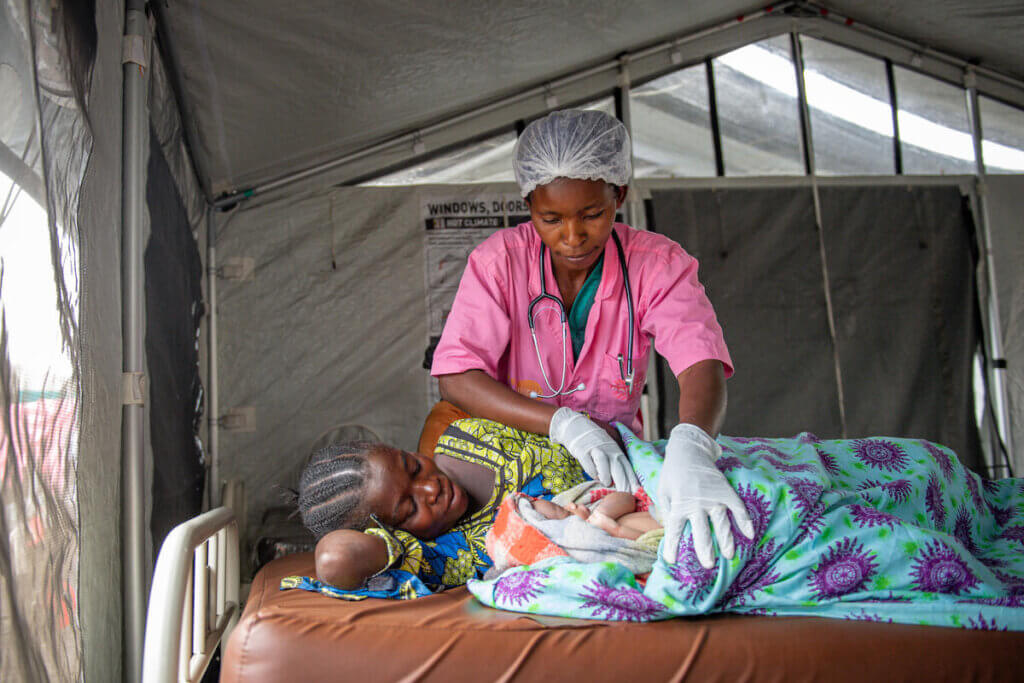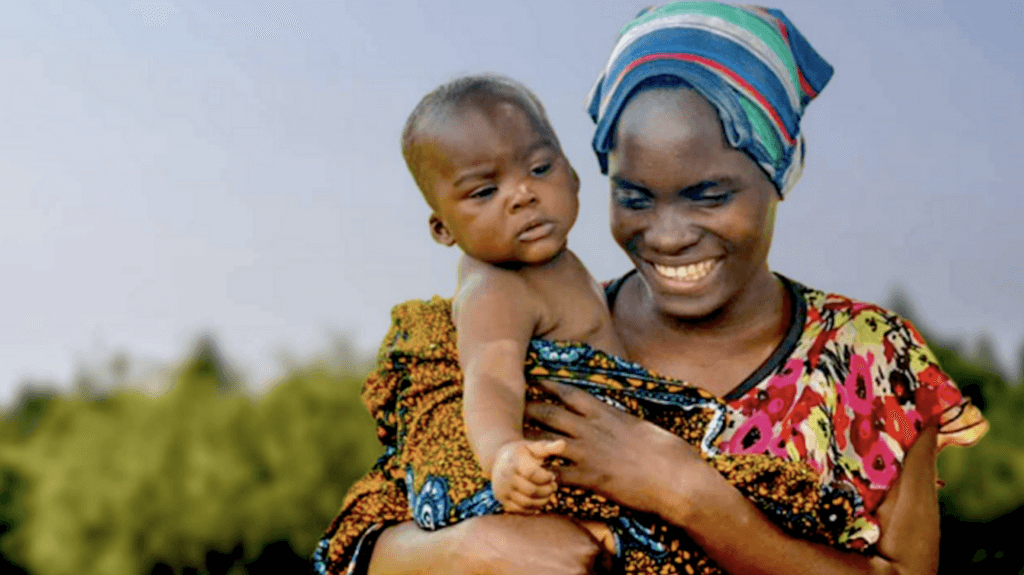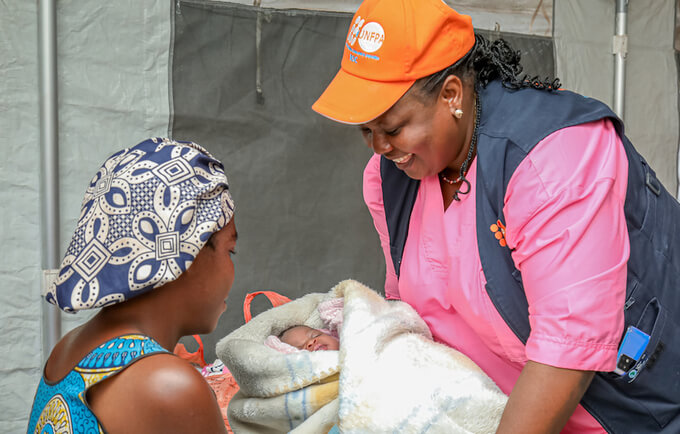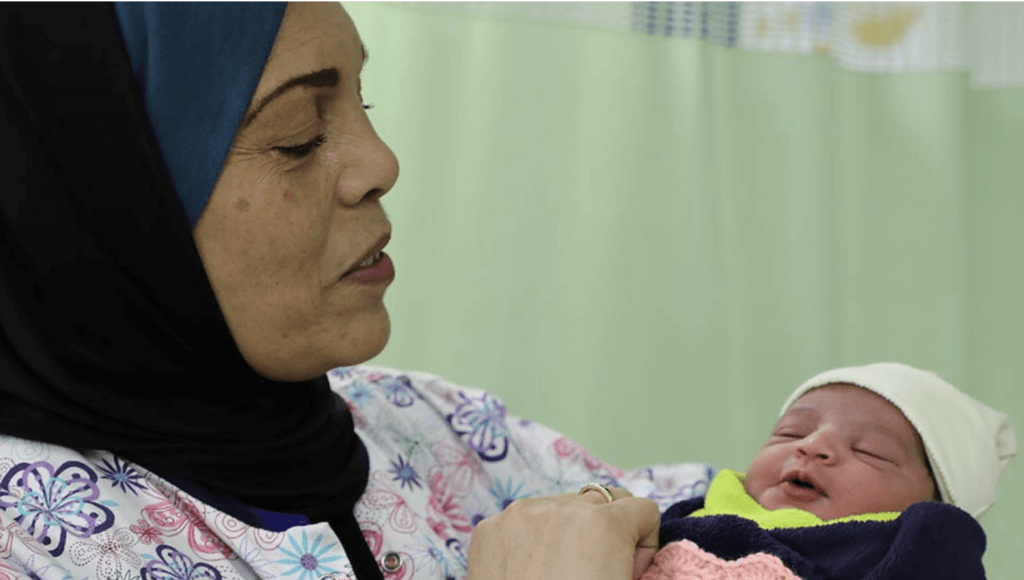Zero Maternal Deaths: A Testament to UNFPA’s Work in Refugee Camps

Many people are forced to leave their homes because of war, danger, or natural disasters. One of the most critical challenges faced by refugees, particularly women, is the access to maternal health care. The risk of dying from pregnancy or childbirth compilations skyrockets during emergencies. In fact, more than half of all maternal deaths occur in humanitarian settings.
Life as a refugee camp is full of uncertainties. Basic amenities are not guaranteed and questions like, “Where will I sleep tonight? Will my children have enough to eat? When will I be able to take a shower?” are abound. For pregnant women, health care and skilled birth attendants may be difficult to access – if they’re available at all.
Despite these challenging circumstances, UNFPA has made remarkable strides in supporting refugees and works to end maternal deaths in refugee camps, so every baby is born safely, no matter how tough the situation.
Refugee Camps with Zero Maternal Deaths
The camp, which was initially established in 1996 for those fleeing the conflict in DRC, has since grown with new arrivals, especially from Burundi, following the political unrest in 2015.
Last year, 6,235 women and girls gave birth at Nyarugusu refugee camp. And not one of them died due to pregnancy or childbirth.
“I thank the health care workers, nurses and doctors for the high-quality, thoughtful services they provided during labor and delivery, and for welcoming my baby into the world,” said 27-year-old Faila Kashindi, pictured below, who gave birth to her fourth child at the camp last year.
Hundreds of thousands of women and girls unfortunately do not get to experience what Faila did: A safe pregnancy and birth. Progress in the global fight to safeguard the lives of mothers has recently stagnated, and in 2020, an estimated 287,000 maternal deaths occurred worldwide.
The United Republic of Tanzania itself has one of the world’s highest rates of maternal death, but thanks to your support, women like Faila have access to the care they need, even in the more dire circumstances.

Bulengo displacement camp, Democratic Republic of the Congo (DRC):
The Bulengo camp is currently sheltering over 100,000 people displaced by the deepening crisis in eastern areas of the DRC. Millions have been caught in the violence and are increasingly vulnerable to climate disasters, disease outbreaks, and a severe lack of basic services.
Since it was set up in February 2023, the UNFPA mobile health clinic in Bulengo displacement camp has recorded zero maternal deaths.
This is an incredible achievement, but especially so in the Democratic Republic of the Congo, where three women die every hour from pregnancy and childbirth complications.
Skilled midwives are available and equipped to meet women’s and newborns’ needs 24 hours a day, every day. “It’s a relief for pregnant women and survivors of violence – they can now access health care without having to travel long distances,” explained Sifa Ndeze, one of the midwives.
One of the only options for thousands of women and girls to access essential sexual and reproductive health care, the clinic is one of three set up by UNFPA in the North Kivu province. The facilities support pregnant women and newborns as well as providing medical treatment for survivors of violence.

Zaatari camp, Jordan:
Zaatari, the largest refugee camp in the world’s largest refugee crisis, has a fully functional mobile health clinic where more than 80,000 Syrians can access essential services. First constructed when Syrians began fleeing war in their country, the camp has now been home to Syrian refugees for more than a decade.
Amazingly, more than 17,000 babies have been safely delivered here, thanks to the dedicated efforts of UNFPA midwives like Ammoun.
As one of the clinic’s 40 health staff, Ammoun works day-in and day-out to ensure women and girls in Zaatari have the care they need. The secret to so many safe deliveries in Zaatari is a robust prenatal care program, early detection and management of pregnancy complications, and an efficient referral system for complex cases.
Another reason for the clinic’s success is that it is truly a safe space for women and girls. In addition to providing the full range of sexual and reproductive services, the clinic also offers mental health counseling for survivors of violence, educational sessions where girls learn about their bodies and rights, and recreational facilities for art classes, soccer, and Zumba classes, By providing all of these services in one place, women and girls are more likely to be able to get the care they need – before it’s too late.

UNFPA’s approach to making every birth safe:
To reach the goal of zero maternal deaths, UNFPA has worked on a multi-faceted approach:
Establishing maternity centers:
In collaboration with local partners and international agencies, UNFPA has set up maternity centers equipped with essential medical supplies and skilled healthcare professionals. These centers offer prenatal check-ups, safe delivery services, and postpartum care.
Training local health workers:
Training programs equip local health workers with essential skills in maternal care. These trained professionals then serve their own communities, ensuring that pregnant women receive timely and culturally appropriate care.
Community engagement:
Understanding the cultural nuances and barriers is crucial. UNFPA engages with community leaders and women’s groups to raise awareness about the importance of maternal health and to dispel myths surrounding childbirth.
The Road Ahead
While the achievement of zero maternal deaths in certain refugee camps is commendable, there’s still a long road ahead. Thousands of women across countless crises still lack access to essential maternal health services. UNFPA remains committed to its vision of ensuring that every childbirth is safe, no matter what.
Join us in our mission to create a world where motherhood is safe and celebrated. Your gift of:
$15 could provide 3 women with an Emergency Birth Kit, which has all the supplies she needs to prevent infection during childbirth, even if a health care professional is unavailable.
$45 could provide 3 women with Dignity Kits, so they have the personal care products they need to maintain their dignity, even in an emergency.
$135 could provide 3 new mothers with mama kits, so they have the supplies they need to care for themselves and their babies after birth.